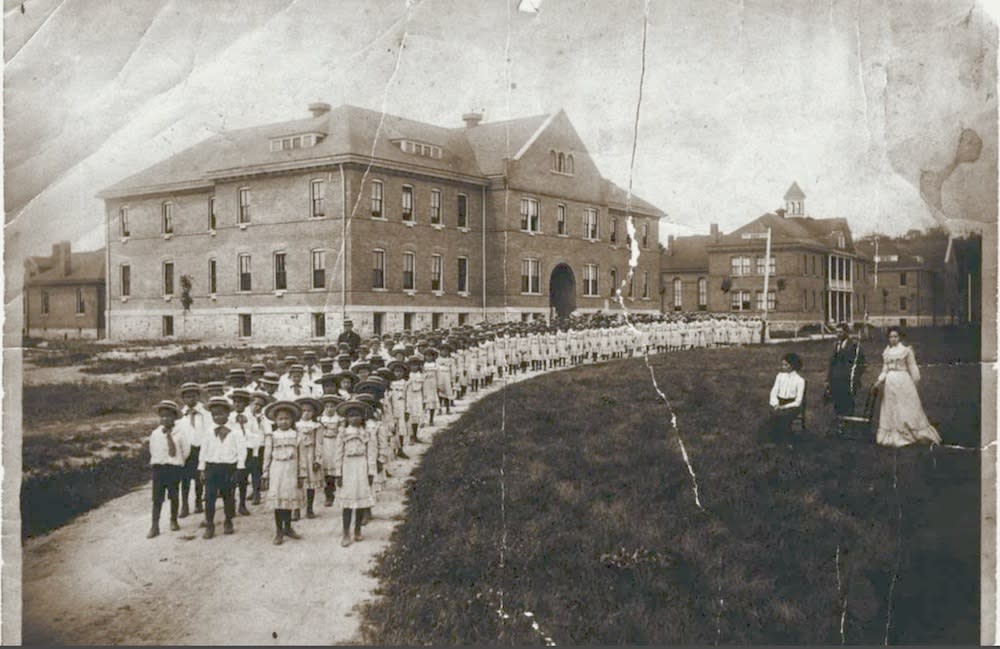Senator Warren Revives Indian Boarding School Legislation with Bipartisan Support

- Oops!Something went wrong.Please try again later.
- Oops!Something went wrong.Please try again later.
- Oops!Something went wrong.Please try again later.
A bipartisan group of 27 US Senators has reintroduced legislation to investigate the federal government’s centuries-long Indian boarding school policies, which led to the attempted termination and assimilation of Native Americans from 1819 through the 1960s.
The bill, called the Truth and Healing Commission on Indian Boarding School Policies in the United States, was introduced by Sen. Elizabeth Warren (D-MA), with support from 26 mostly Democratic senators. Co-sponsors include the leaders of the Senate’s powerful Indian Affairs Committee, including Chairman Brian Schatz (D-HI) and Vice Chair Lisa Murkowski (R-AK). Murkowski is the only Republican signatory to the bill, which was also co-sponsored by Independent Sens. Bernie Sanders (I-VT) and Kyrsten Sinema (I-AZ).
"The Indian Boarding School Policies are a stain on America's history, and it's long overdue that the federal government reckon with its legacy of causing unimaginable suffering and trauma for survivors, victims, and the thousands of Native families who remain impacted,” Warren told Native News Online. “This is why I’m reintroducing legislation to establish a Truth and Healing Commission on Indian Boarding School Policies that would investigate the federal government's shameful actions to terminate the cultures, religions, and languages of Native communities and respond to the intergenerational trauma impacting tribal communities today.”
If passed, a 10-member commission of former Indian boarding school students and truth and healing experts, appointed by the president, would make recommendations “on actions that the Federal Government can take to adequately hold itself accountable for, and redress and heal, the historical and intergenerational trauma inflicted by the Indian Boarding School Policies,” the bill says.
Recommendations would include: protecting unmarked graves, supporting repatriation, and stopping modern-day Indian child removal policies.
The commission would also be empowered to subpoena records from private entities, including churches, that operated schools or institutions intended to assimilate Native youth, as well as government records needed to locate and identify children who attended boarding schools, their tribal affiliations, and unmarked graves. The subpoena power would give the commission a powerful tool that is not available as part of the ongoing investigation of boarding schools by the Department of Interior.
The commission would provide a report within three years of the legislation’s passage into law.
A similar bill was first introduced in 2020 by then-Congresswoman Deb Haaland (Laguna Pueblo), now the Secretary of the Interior. It was re-introduced last year by Sen. Warren, with the House version sponsored by Rep. Sharice Davids (D-KS), a member of the Ho-Chunk Nation and Congressman Tom Cole (R-OK), a member of the Chickasaw Nation. Last year, the Senate Committee on Indian Affairs held a hearing on the legislation, but the bill never moved out of committee.
During the Senate hearing last year, Haaland called the legislation “complementary to the work” of the Interior Department’s boarding-school initiative.
The scope of work outlined in the bill overlaps some of the work currently being undertaken by the Department of the Interior as part of its Federal Indian Boarding School Initiative introduced by Haaland in June 2021. Opponents have criticized the proposed legislation as “partially duplicative” of the Interior’s work.
In the almost two years since, the Interior has undertaken an investigation into the first ever federal accounting of Indian Boarding schools in the country.
A 106-page investigative report—released in May 2022 and penned by Assistant Secretary of Indian Affairs Bryan Newland—details for the first time the extent of the boarding-school network: The federal government operated or supported at least 408 schools in 37 states, including Alaska and Hawai’i, between 1819 and 1969. About half of those schools were run by religious groups. The report found that at least 500 children died while at those schools, though the Department expects that number to rise to “thousands or tens of thousands” with continued investigation.
But that account falls short of the full scope of Indian boarding school policies, and underscores the need for the Truth and Healing Commission Boarding School Policies Act, said Deborah Parker (Tulalips Tribes), CEO of the Native American Boarding School Healing Coalition’s (NABS), which has advocated for the bill since its original introduction.
While the federal initiative is exclusively examining government records connected to the Indian boarding schools it funded or operated, the Truth and Healing commission would cast a far broader net and look at records from every entity that had a hand in running Indian boarding schools, including: churches, private groups, tribes, and government agencies.
“It really is encompassing of anyone who has records of what happened to our Native children during this time period,” Parker told Native News Online.
For example, the Interior report identified 408 institutions that fit its definition of Indian Boarding Schools that operated from the early 1800s through the 1960s, which fell short by at least 100 of NABS’ most recent count.
“We have identified, to date, over 520 federal Indian boarding schools that operated in the U.S.,” Parker said. “Our list connects to churches who may not have received direct funding from the federal government, but still operated under those federal Indian policies. Ours is more inclusive of the full picture, and of private industry.”
Chief Ben Barnes of the Shawnee Nation, who traveled to Washington D.C. to testify in favor of the bill last year, told Native News Online that he’s hopeful for its passage since nobody spoke against it last year.
“This bill is timely,” Chief Barnes said. “If not now, when?”
About the Author: "Jenna Kunze is a staff reporter covering Indian health, the environment and breaking news for Native News Online. She is also the lead reporter on stories related to Indian boarding schools and repatriation. Her bylines have appeared in The Arctic Sounder, High Country News, Indian Country Today, Tribal Business News, Smithsonian Magazine, Elle and Anchorage Daily News. Kunze is based in New York."
Contact: jkunze@indiancountrymedia.com

